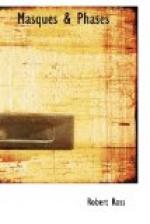London:
Arthur L. Humphreys
187 Piccadilly, W.
1909
The author wishes to express his indebtedness, to Messrs. Smith, Elder for leave to reproduce ‘A Case at the Museum,’ which appeared in the Cornhill of October, 1900; to the Editor of the Westminster Gazette, which first published the account of Simeon Solomon; and to the former proprietors of the Wilsford Press, for kindly allowing other articles to be here reissued. ‘How we Lost the Book of Jasher’ and ’The Brand of Isis’ were contributed to two undergraduate publications, The Spirit Lamp and The Oxford Point of View.
To Harold child, Esq.
THE DEDICATION.
MY DEAR CHILD,
It is not often the privilege of a contributor to address his former editor in so fatherly a fashion; yet it is appropriate because you justified an old proverb in becoming, if I may say so, my literary parent. Though I had enjoyed the hospitality, I dare not say the welcome, of more than one London editor, you were the first who took off the bearing-rein from my frivolity. You allowed me that freedom, of manner and matter, which I have only experienced in undergraduate periodicals. It is not any lack of gratitude to such distinguished editors as the late Mr. Henley; or Mr. Walter Pollock, who first accorded me the courtesies of print in a periodical not distinguished for its courtesy; or Professor C. J. Holmes, who has occasionally endured me with patience in the Burlington Magazine; or Mr. Edmund Gosse, to whom I am under special obligations; that I address myself particularly to you. But I, who am not frightened of many things, have always been frightened of editors. I am filled with awe when I think of the ultramarine pencil that is to delete my ultramontane views. You were, as I have hinted, the first to abrogate its use in my favour. When you, if not Consul, were at least Plancus, I think the only thing you ever rejected of mine was an essay entitled ‘Editors, their Cause and Cure.’ It is not included, for obvious reasons, in the present volume, of which you will recognise most of the contents. These may seem even to your indulgent eyes a trifle miscellaneous and disconnected. Still there is a thread common to all, though I cannot claim for them uniformity. There is no strict adherence to those artificial divisions of literature into fiction, essay, criticism, and poetry. Count Tolstoy, however, has shown us that a novel may be an essay rather than a story. No less a writer than Swift used the medium of fiction for his most brilliant criticism of life; his fables, apart from their satire, are often mere essays. Plato, Sir Thomas More, William Morris, and Mr. H. G. Wells have not disdained to transmit their philosophy under the domino of romance




